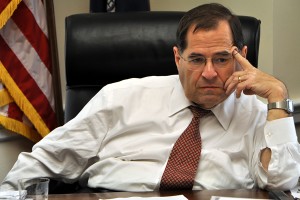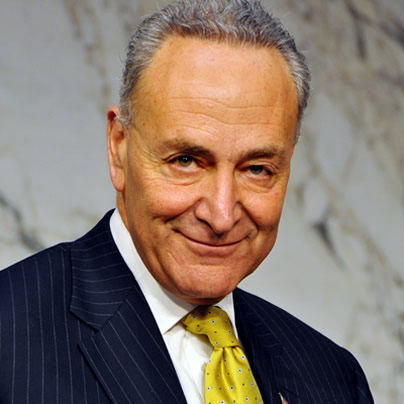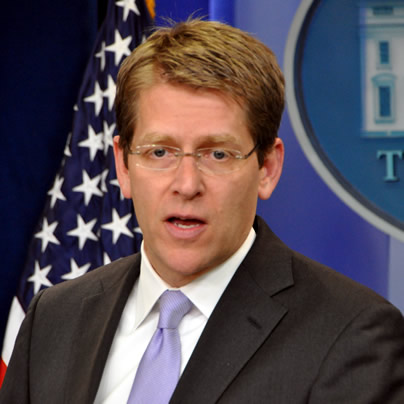National
No DOMA repeal next year: Nadler

Rep. Jerrold Nadler said the Respect for Marriage Act, which would overturn the Defense of Marriage Act, won’t pass next year. (DC Agenda photo by Michael Key)
The sponsor of a bill that would overturn the Defense of Marriage Act said repeal won’t happen in this Congress and that efforts next year will instead be focused on building support on the issue.
Rep. Jerrold Nadler (D-N.Y.) said in an interview with DC Agenda that lawmakers will work on passing other pro-LGBT bills next year, and could take up legislation to repeal DOMA — known as the Respect for Marriage Act — at the end of the two-year session starting in 2011.
“The Respect for Marriage Act is a bill that we can’t pass right now; we know we can’t pass it right now,” he said.
Nadler said Congress won’t take up the DOMA repeal next year because other LGBT-related bills, including the Employment Non-Discrimination Act, legislation providing partner benefits for LGBT federal workers and a repeal of “Don’t Ask, Don’t Tell,” are taking precedence. Supporters hope to pass those measures by the end of 2010.
“The Respect for Marriage Act comes up after that, maybe at the end of the next Congress, maybe afterward,” he said.
Nadler’s legislation would overturn DOMA, allowing the federal government to recognize same-sex marriages. It also has a “certainty provision” that would allow same-sex couples to marry in one state and still receive federal benefits even if they move to another state where gay nuptials aren’t recognized.
In lieu of passage in this Congress, Nadler said the task for supporters is to find more co-sponsors for the bill. As of Tuesday, the bill had 105 co-sponsors. Nadler predicted support would grow.
“And I think if some of these other bills pass, it’ll become more — the idea becomes less avant garde,” he said.
In response to Nadler’s remarks that a DOMA repeal won’t happen next year, Evan Wolfson, executive director of Freedom to Marry, said, “I don’t think we should begin the conversation about when it’s going to happen. I think we should begin the conversation with how do we build support and make it happen.”
“There are two ways to talk about our movement,” he said. “One is to talk about what it’s really about, to actually make the case for inclusion and fairness and freedom, to talk about why marriage matters. … The other is to spend all our time talking about the chess game or the political horse race, and we spend too much time on the latter and not enough time doing the former.”
Wolfson said supporters should begin the conversation “by each one of us calling our senators and member of Congress, asking them to sign on to the bill.”
Strategic decisions
Nadler’s prediction that a DOMA repeal won’t happen by the end of next year comes after other key potential supporters have said other LGBT legislation will be a priority.
At the time the Respect for Marriage Act was introduced in September, Drew Hammill, a spokesperson for House Speaker Nancy Pelosi, said the speaker is “focused on legislative items that we can enact into law now,” including ENDA.
And gay Rep. Barney Frank (D-Mass.) hasn’t signed on as a co-sponsor to Nadler’s bill, saying that lawmakers will instead focus on other LGBT issues this Congress and the bill’s certainty provision could cause political problems for House members seeking re-election.
Nadler said he hasn’t “had too many conversations” with Pelosi on the proposed DOMA repeal since it was introduced, but noted that the speaker has privately encouraged House members to co-sponsor the bill.
As for Frank, Nadler also said he hasn’t spoken much with the Massachusetts lawmaker on the issue since the bill’s introduction.
“We have a disagreement on the strategy on this obviously, as we had a disagreement on the strategy over the non-inclusive ENDA last [Congress] where we no longer have that disagreement,” he said. “And, I presume, in the end, we will not have a disagreement on this.”
Although supporters have said other bills will take priority this Congress, advocates for the DOMA repeal have hoped for congressional hearings on marriage by the end of next year.
But Nadler, who chairs a House Judiciary subcommittee with jurisdiction over marriage, said he wouldn’t commit to holding hearings on the issue by the end of next year and would hear only testimony “when we think it’s advantageous to do so.”
“And that’s a strategic decision, a tactical decision you have to make,” he said. “As things go on, we’ll have to see how things go. Right now, the thing is get the idea out there to get pressure built, to get more sponsors — and that’s the way to go.”
Asked whether Democratic leadership requested that he not hold hearings on marriage, Nadler replied, “No, they did not.”
Nadler said he expects a Senate companion to the Respect for Marriage Act would be introduced early next year, noting there are a number of potential sponsors for the Senate legislation.
Advocates have named Sen. Russ Feingold (D-Wisc.) as a prime target in talks because he chairs a Senate Judiciary subcommittee with jurisdiction over marriage. Nadler said Feingold would “possibly” champion the Senate legislation.
Nadler said a Senate bill has yet to emerge so many months after the House introduction in September because potential supporters have been occupied with other tasks.
“Some of the people we’re dealing with are very busy with a number of other things,” he said. “There’s not a sense of urgency, the sense that this bill has to have a Senate sponsor right now because it’s going to pass right now, because it’s not, so we’re talking.”
Even without a sense of urgency among lawmakers, Nadler said he thinks DOMA should be repealed because it’s “a stain on the national honor.”
“Even if you didn’t have a lot of practical effects, which obviously it does have, it’s wrong to keep such things on the books,” he said. “The honor of the country demands we repeal it.”
Same-sex marriage is only legal in five states throughout the country, but Nadler predicted that number would grow in coming years, and would include his home state of New York.
The Empire State was seen to be on the precipice of legalizing same-sex marriage, but the hopes of supporters were dashed last week when the state Senate killed a bill that would have granted marriage rights for same-sex couples. Nadler, who served in the New York Assembly for 16 years before being elected to Congress, said same-sex marriage will nonetheless be legalized in the state in a few years.
“I’d be very surprised if New York didn’t pass a gay marriage bill in the next two years, and I’ve been studying New York politics for 40 years,” he said. “And as long as we keep a Democratic governor and state Senate in the next election, we’ll get a gay marriage bill relatively soon in New York.”
As the number of states with same-sex marriage grow, Nadler said support for the Respect for Marriage Act also will build.
“Especially as a number of states have gay marriage, and the sky doesn’t fall in, and nobody comes in and busts up regular marriages — other than what’s busting up anyway — I think the issue will recede in the sense that people will lose their sense of the novelty,” he said.

Rep. Jerrold Nadler said of his home state that ‘as long as we keep a Democratic governor and state Senate in the next election, we’ll get a gay marriage bill relatively soon in New York.’ (DC Agenda photo by Michael Key)
Gay immigration bill could join reform debate
Another bill Nadler is championing in the House is the Uniting American Families Act, which would enable gay Americans to sponsor their foreign partners for residency. With an effort to pass comprehensive immigration reform expected in Congress next year, advocates are trying to include UAFA as a provision in the larger legislation.
Nadler said the White House seems to want to take on immigration reform in the spring and said UAFA supporters will “make a major thrust to make this part of the comprehensive immigration reform debate.”
The lawmakers drafting comprehensive immigration reform legislation are Rep. Zoe Lofgren (D-Calif.), Rep. Luis Gutierrez (D-Ill.) and Sen. Chuck Schumer (D-N.Y.). Nadler said it’s “hard to say” whether those bills would include a UAFA provision upon their introduction.
“There are a lot of cross pressures and we haven’t had those — we’ve started but we haven’t finished those conversations at this point,” he said.
But Steve Ralls, a spokesperson for Immigration Equality, said he’s “optimistic” immigration reform measures will include UAFA at their debut because supporters, including other lawmakers, immigration groups and LGBT groups, have been lobbying for an inclusive bill for some time.
“I don’t know what the final comprehensive immigration reform will look like, but I remain optimistic that it will include lesbian and gay families,” he said.
In the event that comprehensive immigration reform legislation doesn’t include UAFA when it debuts, Nadler said he’s working on making sure there are votes in the House Judiciary Committee to amend the bill to include such a provision.
Nadler said he’s “hopeful” there will be enough votes for an amendment, but added “that’ll be a big fight, if necessary.”
“I haven’t taken any votes or whip counts or done any kind of that work, but certainly it will be something that we’ll have to work at and the gay community and everybody will have to be pressuring the individual members of the committee,” Nadler said. “A lot of the members of the committee, the Democratic members especially, say they’re very great friends with the gay community … and this’ll be an opportunity to show that they are, bar none.”
One major obstacle that UAFA supporters will face is opposition from Catholic leaders. The U.S. Conference of Catholic Bishops has urged lawmakers to exclude the provision from immigration reform because church leaders support reform, but oppose the LGBT-specific provision.
Nadler said opposition to UAFA from Catholic leaders will make inclusion of the measure in the bill “a very difficult fight.”
“So, there will be some who will be tempted to say, ‘Wait a minute, let’s not alienate some of our major supporters on this legislation to pass it,’” he said. “There’ll be others of us saying, ‘Hey, no, if you’re doing a comprehensive bill, it’s got to be comprehensive. You can’t just leave certain people out.”
Even with opposition from Catholic leaders, Ralls said the list of religious groups who support the inclusion of UAFA in immigration reform “is very long and diverse,” and includes Quakers and Episcopalians.
“If the Conference of Catholic Bishops decides that they’re willing to throw the immigrant community under the bus because of the inclusion of LGBT couples, I think that would be a shame because, at the end of the day, immigration reform can help millions of families — both gay and straight — and that should be Congress’ priority.”
Asked whether he would support immigration reform legislation that doesn’t include a UAFA provision, Nadler replied, “I hope it doesn’t come to that.”
“All my efforts are designed to make sure it doesn’t come to that, so I’m not going to get into what happens at that point,” he said.
‘We will see a fair amount of action’
During his Agenda interview, Nadler also addressed arguments that the Obama administration and Congress haven’t made sufficient progress on LGBT issues since the start of this year.
The lawmaker said Congress has had a significant workload this year — including the passage of two annual budgets as well as stimulus and relief legislation for financial institutions — and that advocates for LGBT issues would be better to make judgments on Congress’ work at the end of next year.
“I think it would be very fair by the time the election rolls around next October to say we haven’t done enough on these issues,” he said. “I think a lot of things have been fermenting and cooking. I think we will see a fair amount of action on these issues in next year’s session.”
Asked whether President Obama could have spoken more forcefully on LGBT issues since the start of his administration, Nadler replied, “I think he could have been more forthright on some of them.” He declined to elaborate.
In response to recent criticism that lawmakers have been putting off action on ENDA, Nadler said some key supporters of the bill have been occupied with other issues. He noted the sponsor of the bill is Frank, who, as chair of the House Financial Services Committee, is also working on the Troubled Asset Relief Program legislation.
“Why aren’t we doing ENDA right now?” he said. “But what else are some of the key people doing? They’re over their heads with the financial reform, which no one anticipated six months ago. I suspect that once that is out of the way, which it should be soon, these kind of issues can come to the fore again.”
But John Aravosis, a gay blogger who has been leading an LGBT boycott of the Democratic National Committee, criticized the notion that Congress hasn’t acted on LGBT issues because lawmakers have been busy with other issues.
He said the Obama administration has found time to take swipes at the LGBT community by defending DOMA in court and, more recently, saying it couldn’t follow a court order from the Ninth Circuit judge to provide health benefits to the partner of a lesbian federal employee.
“It’s not enough just for them to say, ‘It’s been busy,’” he said. “Well, it hasn’t been busy — or so busy that they couldn’t take swipes at us.”
Aravois commended Nadler for being outspoken on LGBT issues, but questioned whether Nadler would criticize a Democratic Congress as a Democratic lawmaker, and whether Congress would, in fact, take up LGBT issues next year.
“Good luck passing gay rights legislation right before an election,” he said. “Democrats don’t have balls in off years — they certainly don’t have them right before elections, on gay issues especially.”
With regard to the LGBT legislation that Congress would take up next year, Nadler expressed uncertainty about the prediction that Congress would repeal “Don’t Ask, Don’t Tell” next year as part of the authorization bill for the fiscal year 2011 defense budget. Frank told the media last month that was the way he envisioned repeal.
But Nadler said repeal through the defense budget might not be the best way to overturn “Don’t Ask, Don’t Tell.” With the president calling for escalation of operations in Afghanistan, Nadler said such a provision would put more liberal members of Congress in a quandary over whether to vote for repeal and military operations at the same time.
“You don’t want to put people in the position of saying, ‘You vote against Afghanistan funding, you’re voting against [repealing] “Don’t Ask, Don’t Tell,”’ or vice-versa,” he said. “So maybe you need a new option or something. These are tactical considerations, which you have to look at as things unfold.”
Nadler said he, for example, didn’t “like this idea of sending more troops to Afghanistan,” although he supports a “Don’t Ask, Don’t Tell” repeal.
With public approval polls showing support waning for Democrats, Nadler predicted congressional Democrats will lose seats in the 2010 election, but added a hope that the party won’t lose “too many” seats. He noted that the November results would largely depend on how well the economy is faring.
Even with Democrats potentially in danger, Nadler said he didn’t think lawmakers would avoid LGBT issues next year to reduce a perceived risk of alienating voters before the election.
“I think we’re going to face most of these issues this Congress, mostly next year,” he said. “I’m assuming that the gay community is going to keep the pressure on. I mean, don’t go to sleep because I said it as that. If the gay community keeps the pressure on, then I think that, yes, we’ll probably face most of these issues.”
Pennsylvania
Malcolm Kenyatta could become the first LGBTQ statewide elected official in Pa.
State lawmaker a prominent Biden-Harris 2024 reelection campaign surrogate

Following his win in the Democratic primary contest on Wednesday, Pennsylvania state Rep. Malcolm Kenyatta, who is running for auditor general, is positioned to potentially become the first openly LGBTQ elected official serving the commonwealth.
In a statement celebrating his victory, LGBTQ+ Victory Fund President Annise Parker said, “Pennsylvanians trust Malcolm Kenyatta to be their watchdog as auditor general because that’s exactly what he’s been as a legislator.”
“LGBTQ+ Victory Fund is all in for Malcolm, because we know he has the experience to win this race and carry on his fight for students, seniors and workers as Pennsylvania’s auditor general,” she said.
Parker added, “LGBTQ+ Americans are severely underrepresented in public office and the numbers are even worse for Black LGBTQ+ representation. I look forward to doing everything I can to mobilize LGBTQ+ Pennsylvanians and our allies to get out and vote for Malcolm this November so we can make history.”
In April 2023, Kenyatta was appointed by the White House to serve as director of the Presidential Advisory Commission on Advancing Educational Equity, Excellence and Economic Opportunity for Black Americans.
He has been an active surrogate in the Biden-Harris 2024 reelection campaign.
The White House
White House debuts action plan targeting pollutants in drinking water
Same-sex couples face higher risk from environmental hazards

Headlining an Earth Day event in Northern Virginia’s Prince William Forest on Monday, President Joe Biden announced the disbursement of $7 billion in new grants for solar projects and warned of his Republican opponent’s plans to roll back the progress his administration has made toward addressing the harms of climate change.
The administration has led more than 500 programs geared toward communities most impacted by health and safety hazards like pollution and extreme weather events.
In a statement to the Washington Blade on Wednesday, Brenda Mallory, chair of the White House Council on Environmental Quality, said, “President Biden is leading the most ambitious climate, conservation, and environmental justice agenda in history — and that means working toward a future where all people can breathe clean air, drink clean water, and live in a healthy community.”
“This Earth Week, the Biden-Harris Administration announced $7 billion in solar energy projects for over 900,000 households in disadvantaged communities while creating hundreds of thousands of clean energy jobs, which are being made more accessible by the American Climate Corps,” she said. “President Biden is delivering on his promise to help protect all communities from the impacts of climate change — including the LGBTQI+ community — and that we leave no community behind as we build an equitable and inclusive clean energy economy for all.”
Recent milestones in the administration’s climate policies include the U.S. Environmental Protection Agency’s issuance on April 10 of legally enforceable standard for detecting and treating drinking water contaminated with polyfluoroalkyl substances.
“This rule sets health safeguards and will require public water systems to monitor and reduce the levels of PFAS in our nation’s drinking water, and notify the public of any exceedances of those levels,” according to a White House fact sheet. “The rule sets drinking water limits for five individual PFAS, including the most frequently found PFOA and PFOS.”
The move is expected to protect 100 million Americans from exposure to the “forever chemicals,” which have been linked to severe health problems including cancers, liver and heart damage, and developmental impacts in children.
An interactive dashboard from the United States Geological Survey shows the concentrations of polyfluoroalkyl substances in tapwater are highest in urban areas with dense populations, including cities like New York and Los Angeles.
During Biden’s tenure, the federal government has launched more than 500 programs that are geared toward investing in the communities most impacted by climate change, whether the harms may arise from chemical pollutants, extreme weather events, or other causes.
New research by the Williams Institute at the UCLA School of Law found that because LGBTQ Americans are likelier to live in coastal areas and densely populated cities, households with same-sex couples are likelier to experience the adverse effects of climate change.
The report notes that previous research, including a study that used “national Census data on same-sex households by census tract combined with data on hazardous air pollutants (HAPs) from the National Air Toxics Assessment” to model “the relationship between same-sex households and risk of cancer and respiratory illness” found “that higher prevalence of same-sex households is associated with higher risks for these diseases.”
“Climate change action plans at federal, state, and local levels, including disaster preparedness, response, and recovery plans, must be inclusive and address the specific needs and vulnerabilities facing LGBT people,” the Williams Institute wrote.
With respect to polyfluoroalkyl substances, the EPA’s adoption of new standards follows other federal actions undertaken during the Biden-Harris administration to protect firefighters and healthcare workers, test for and clean up pollution, and phase out or reduce use of the chemicals in fire suppressants, food packaging, and federal procurement.
Maine
Maine governor signs transgender, abortion sanctuary bill into law
Bomb threats made against lawmakers before measure’s passage

BY ERIN REED | On Tuesday, Maine Gov. Janet Mills signed LD 227, a sanctuary bill that protects transgender and abortion providers and patients from out-of-state prosecution, into law.
With this action, Maine becomes the 16th state to explicitly protect trans and abortion care in state law from prosecution. This follows several bomb threats targeting state legislators after social media attacks from far-right anti-trans influencers such as Riley Gaines and Chaya Raichik of Libs of TikTok.
An earlier version of the bill failed in committee after similar attacks in January. Undeterred, Democrats reconvened and added additional protections to the bill before it was passed into law.
The law is extensive. It asserts that gender-affirming care and reproductive health care are “legal rights” in Maine. It states that criminal and civil actions against providers and patients are not enforceable if the provision or access to that care occurred within Maine’s borders, asserting jurisdiction over those matters.
It bars cooperation with out-of-state subpoenas and arrest warrants for gender-affirming care and abortion that happen within the state. It even protects doctors who provide gender-affirming care and abortion from certain adverse actions by medical boards, malpractice insurance, and other regulating entities, shielding those providers from attempts to economically harm them through out-of-state legislation designed to dissuade them from providing care.
You can see the findings section of the bill here:
The bill also explicitly enshrines the World Professional Association of Transgender Health’s Standards of Care, which have been the target of right-wing disinformation campaigns, into state law for the coverage of trans healthcare:
The bill is said to be necessary due to attempts to prosecute doctors and seek information from patients across state lines. In recent months, attorneys general in other states have attempted to obtain health care data on trans patients who traveled to obtain care. According to the U.S. Senate Finance Committee, attorneys general in Tennessee, Indiana, Missouri, and Texas attempted to obtain detailed medical records “to terrorize transgender teens in their states … opening the door to criminalizing women’s private reproductive health care choices.”
The most blatant of these attempts was from the attorney general of Texas, who, according to the Senate Finance Committee, “sent demands to at least two non-Texas entities.” One of these entities was Seattle Children’s Hospital, which received a letter threatening administrators with arrest unless they sent data on Texas patients traveling to Seattle to obtain gender-affirming care.
Seattle Children’s Hospital settled that case out of court this week, agreeing to withdraw its Texas business registration in return for Texas dropping its investigation. This likely will have no impact on Seattle Children’s Hospital, which has stated it did not treat any youth via telemedicine or in person in Texas; the hospital will be able to continue treating Texas youth who travel outside of Texas to obtain their care. That settlement was likely compelling due to a nearly identical law in Washington that barred out-of-state investigations on trans care obtained solely in the state of Washington.
The bill has faced a rocky road to passage. A similar bill was debated in January, but after coming under intense attack from anti-trans activists who misleadingly called it a “transgender trafficking bill,” the bill was voluntarily withdrawn by its sponsor.
When LD 227 was introduced, it faced even more attacks from Gaines and Libs of TikTok. These attacks were followed by bomb threats that forced the evacuation of the legislature, promising “death to pedophiles” and stating that a bomb would detonate within a few hours in the capitol building.
Despite these threats, legislators strengthened both the abortion and gender-affirming care provisions and pressed forward, passing the bill into law. Provisions found in the new bill include protecting people who “aid and assist” gender-affirming care and abortion, protections against court orders from other states for care obtained in Maine, and even protections against adverse actions by health insurance and malpractice insurance providers, which have been recent targets of out-of-state legislation aimed at financially discouraging doctors from providing gender-affirming care and abortion care even in states where it is legal.
See a few of the extensive health insurance and malpractice provisions here:
Speaking about the bill, Gia Drew, executive director of Equality Maine, said in a statement, “We are thrilled to see LD 227, the shield bill, be signed into law by Gov. Mills. Thanks to our pro equality and pro reproductive choice elected officials who refused to back down in the face of disinformation. This bill couldn’t come into effect at a better time, as more than 40 percent of states across the country have either banned or attempted to block access to reproductive care, which includes abortions, as well as transgender healthcare for minors. Thanks to our coalition partners who worked tirelessly to phone bank, lobby, and get this bill over the finish line to protect community health.”
Destie Hohman Sprague of the Maine Women’s Lobby celebrated the passage of the bill despite threats of violence, saying in a statement, “A gender-just Maine ensures that all Mainers have access to quality health care that supports their mental and physical wellbeing and bodily autonomy, including comprehensive reproductive and gender-affirming care. We celebrate the passage of LD 227, which helps us meet that goal. Still, the patterns of violence and disinformation ahead of the vote reflected the growing connections between misogyny, extremism, and anti-democratic threats and actions. We must continue to advocate for policies that protect bodily autonomy, and push back against extremist rhetoric that threatens our states’ rights and our citizens’ freedoms.”
The decision to pass the legislation comes as the Biden administration released updated HIPAA protections that protect “reproductive health care” from out-of-state prosecutions and investigations.
Although the definition of “reproductive health care” is broad in the new HIPAA regulations, it is uncertain whether they will include gender-affirming care. For at least 16 states, though, gender-affirming care is now explicitly protected by state law and shielded from out-of-state legislation, providing trans people and those seeking abortions with protections as the fight increasingly crosses state lines.
****************************************************************************

Erin Reed is a transgender woman (she/her pronouns) and researcher who tracks anti-LGBTQ+ legislation around the world and helps people become better advocates for their queer family, friends, colleagues, and community. Reed also is a social media consultant and public speaker.
******************************************************************************************
The preceding article was first published at Erin In The Morning and is republished with permission.
-

 State Department2 days ago
State Department2 days agoState Department releases annual human rights report
-

 Maryland4 days ago
Maryland4 days agoJoe Vogel campaign holds ‘Big Gay Canvass Kickoff’
-

 Politics3 days ago
Politics3 days agoSmithsonian staff concerned about future of LGBTQ programming amid GOP scrutiny
-

 The White House1 day ago
The White House1 day agoWhite House debuts action plan targeting pollutants in drinking water












